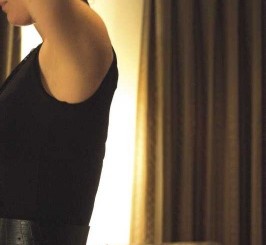
[White Noise]
“I feel most coloured when I am thrown against a sharp white background”
—Zora Neale Hurston
While never explicitly quoted in the show, this statement seems to inform the entire world of WHITE/OTHER. From the text to the set design to performer Alice Canton’s very own biracial identity, whiteness is everywhere. And Alice’s otherness—specifically, her Chinese half—becomes the glaring issue of the play by sheer contrast.
The relationship between artist and audience is a constant negotiation, and especially delicate when dealing with race. How do you challenge without offending or educate without condescending? Alice handles this well, never resorting to cheap laughs or uncomfortable audience participation, but there’s also rarely any real sense of threat or surprise. The result feels overly cautious and diplomatic at times.
Casually delivered to us, mostly as offhand remarks or sudden thoughts, Alice’s observations are all well-observed and, at their best, powerfully succinct. The problem is these observations only make up a short portion of the tight 60-minute show, barely skimming the surface of the Chinese-Kiwi experience. The inherently didactic material is made palatable, but perhaps too palatable. This is especially apparent when the show touches on potentially contentious topics such as orientalism, fetishisation, bi-racial identity and micro-aggressions only to leave them unexplored. The focus subsequently becomes more about its mechanics and stylistic ambitions rather than thematic concerns, where content seems to be at the mercy of the form.
Thankfully the form of the play is incredibly watchable. WHITE/OTHER attempts to challenge the way we talk about race. Gone are any reliable narrative expectations, replaced by an experimental and constantly evolving structure that reflects the slipperiness of the subject matter. Alice juggles multiple performance styles from pantomime to spoken word to personal confession. Not only does she inhabit each role to perfection, but her transitions seem effortless too. Ruby Reihana-Wilson’s lighting assists Alice here, signifying the worlds of the play with clarity. Christine Urquhart’s set is the perfect blank slate, rendering the aforementioned “white background” in a bluntly literal fashion. The excess of white takes on an overwhelming rather than neutral presence. The space is also anchored by multiple platforms of different sizes, throwing the entire world off-balance. But the biggest surprise is the way the space is haunted aurally by Te Aihe Butler’s sound design, echoing and looping Alice’s carefully curated quotes and live percussion.
Alice’s observations eventually build towards the emotional climax of the show. Here she rips down her detached exterior and reveals herself to us, as flesh and blood rather than a mere mouthpiece. It’s an undoubtedly powerful and personal moment, but the catharsis seems rushed. If it works at all it’s because Alice’s performance always maintains an easy affability, even when the text doesn’t support that. We want to care about her, despite not knowing her. What’s missing are some crucial beats and a clearer arc. At the moment, the show shifts from an intellectual distance to uncensored rawness too suddenly. I find myself observing rather than experiencing Alice’s hurt, eliciting sympathy rather than empathy.
But she saves her very best theatrical sucker punch until the end. It’s a tactic that assaults the audience with an ugly mix of feelings, ranging from abject disgust to outright bewilderment. But the more it sinks in the more it feels like perfection. It’s the type of bold risk we expect to see onstage but rarely do. Perhaps even the boldest I’ve seen so far all year.
WHITE/OTHER has the outline of a great show that just needs some filling in. In its current iteration, the content and form feel wildly out of balance with too much emphasis on the latter. And while the co-directors Holly Chappell and Tom Eason do great work bringing the struggle between white versus other to life in the aesthetic, the text demands further interrogation.
At it’s most potent and pessimistic, WHITE/OTHER suggests that the race conversation, no matter how much we scream and shout, is always going to be undermined by white noise. But by merely existing, the show challenges that very notion, demanding to be heard. A powerfully contradictory message that will get under your skin.
WHITE/OTHER plays at The Basement until 21 April.



Leave a Reply